Honorable Governor of Bihar Shri Arif Mohammad Khan delivered the fifth Khan Abdul Ghaffar Khan Annual Memorial Lecture titled “Reflections on Indian Culture: Making Sense of Its Universal Voice” at the Dr. M. A. Ansari Auditorium, Jamia Millia Islamia (JMI), yesterday, in the presence of Vice Chancellor Prof. Mazhar Asif, Registrar Prof. Md. Mahtab Alam Rizvi, Prof. Tanuja, Dean, Officiating Director of the Centre for the Study of Social Inclusion (CSSI), and Dean of Academic Affairs, along with Dr. Mujibur Rehman, CSSI, the convener of the event.
The annual memorial lecture held in memory of Khan Abdul Ghaffar Khan, a prominent Pashtun leader, a towering figure in India’s freedom struggle, and a close associate of Mahatma Gandhi, was organized by JMI's Centre for the Study of Social Inclusion (CSSI). JMI is the only university in the country to have instituted a memorial lecture in the year 2017 to celebrate the life and legacy of Khan Abdul Ghaffar Khan, who in 1987 was awarded India’s highest civilian honor, the Bharat Ratna, for his contributions to peace and humanity.
The Hon’ble Governor was formally received at the Centenary Gate by the Vice Chancellor, Registrar, and senior officials of Jamia Millia Islamia. This was followed by a grand Guard of Honour presented by NCC cadets, marking the ceremonial commencement of the function. Upon his arrival at the auditorium, the Governor was felicitated by the Vice Chancellor and Registrar. Prof. Tanuja welcomed the august gathering comprising Deans of Faculties, Heads of Departments, Directors of Centres, Officers of JMI, faculty members, and students and introduced the lecture series and the vision and mission behind CSSI as well as the memorial lecture. “Today's lecture is particularly significant as it is being held on the occasion of the Constitution Day of India, November 26th, and therefore it is only befitting that the Hon’ble Governor is very kindly gracing the university as the Chief Guest on this historic day,” Prof. Tanuja added.
The program started with a recitation of a verse from the Holy Quran, followed by the singing of the Jamia Tarana. Soon after this, in a solemn tribute to Khan Abdul Ghaffar Khan, the Governor lit traditional diyas before his portrait and paid homage to the values of peace and non-violence that shaped Ghaffar Khan’s life and work as he, in the words of the Governor, “converted the tribal Pashtuns to a peace-loving people.” Hon’ble Governor Shri Arif Mohammad Khan, further recalling the great contributions and sacrifices of Khan Abdul Ghaffar Khan to India’s freedom struggle against British rule, called Ghaffar Khan “the star of our freedom movement, which is why he was given the title of ‘Frontier Gandhi.’”
In a speech full of historical references, Hon'ble Governor Shri Arif Mohammad Khan, citing the greatest Indian, Persian, Arabic, and Greek philosophers and saints, in addition to religious texts, spoke eloquently about the distinctive features of the Indian culture. He said, “An in-depth study of the teachings of great saints, right from Adi Shankaracharya to Swami Vivekananda, having roots in the Vedanta philosophy and teachings of the Upanishads, shows that the Indian culture is based on a vision of a universal culture that does not view a person in terms of the characteristics associated with identity, like caste, color, or creed, but instead views the human being as ‘an inalienable and indivisible being’ premised on the belief that the atma, or the divine, dwells within everyone, and therefore every human being is seen as potentially divine.” He noted that the Indian culture gives this lofty understanding of the human being and, to that extent, stands apart for its ability to “humanize divinity flowing from the spirit of Ekatmata, or the oneness of being.”
Drawing parallels with the life of Khan Abdul Ghaffar Khan, Hon’ble Governor Shri Khan noted that among the five great civilizations that the world has witnessed, “the Indian civilization is the greatest, as it is known for the promotion of knowledge and wisdom.” Alluding to one of the finest Urdu poets of the subcontinent, Allama Iqbal, he said the lines ‘Mir-e-Arab ko aai,,,Thandi hawa jahan se…mera watan vahi hai mera vatan vahi hai’ referred to India as the land from where the cool breeze (thandi hawa) of knowledge and wisdom originated and swept to the Arab world and everywhere else.
Referring to Swami Vivekananda’s well-known India’s Message to the World, which emphasized on universal spirituality, divinity within individuals, the practical nature of prayers and worship, higher knowledge flowing from experience, and the dignity of the human being, Hon'ble Governor, Shri Arif Mohammad Khan, called it the one solution or the significant message from India that can ease the problems of war and suffering that the world is currently facing. “While the rest of the world recognized the concept of the dignity of human beings only in 1948 and thereafter, India gave the message of the divinity of mankind centuries ago,” Shri Arif Mohammad Khan added.
Prof. Md. Mahtab Alam Rizvi, in his address, emphasized the concept of nationalism enunciated by Khan Abdul Ghaffar Khan, which inspired the nationalists of the time to put up a united front to fight the colonial rule. Prof. Rizvi said that the ‘Frontier Gandhi,’ who founded the anti-colonial, non-violent movement called the ‘Khudai Khidmatgar,’ dedicated his life to the cause of the freedom of India and the Pashtun people and was continuously targeted by the British for this. Underscoring Ghaffar Khan’s faith in unity and non-violence to win freedom, Prof. Rizvi recalled how Ghaffar Khan was pained and hurt to hear the news about the proposed partition of India and always believed that the freedom of India was central to the freedom of all of South Asia. “The values of inclusive nationalism, secularism, compassion, and resistance using non-violence defined his belief that the progress of India lay in an undivided, inclusive, and democratic Bharat,” Prof. Rizvi added. “Abdul Ghaffar Khan’s legacy stood as a powerful reminder that true nationalism is rooted in harmony, justice, human dignity, and the spirit of a unified Bharat,” he said.
In his presidential remarks, VC JMI, Prof. Mazhar Asif, said that JMI was an outstanding example of the best and highest quality of education, nationally and globally as it was rooted in the principles of empathy, coexistence, sanskar, taleem, tahzeeb, tarbiyat, skill and value-based education, devotion to the country, and national service. He emphasized that India's cultural traditions were centered on empathy, coexistence, dialogue and education, self-discipline, and the empowerment of the weakest sections of society. He also highlighted the diversity and timeless pluralism of Indian civilization and emphasized the relevance of these ideals, which were aptly illustrated by Khan Abdul Ghaffar Khan’s life. Prof. Asif noted that the spiritual and ethical foundations of Indian culture hold a universal appeal that continues to guide societies towards peace and mutual respect.
In the past, the Khan Abdul Ghaffar Khan annual memorial lectures were delivered by eminent scholars and public intellectuals—Shri Rajmohan Gandhi, grandson of Mahatma Gandhi in 2017; Former CEO, NITI Aayog, Shri Amitabh Kant, in 2018; professor emerita of Jawaharlal Nehru University, Prof. Zoya Hasan, in 2019; and Prof. Shruti Kapila, University of Cambridge in 2020.


